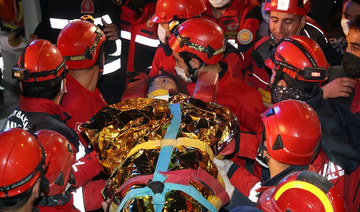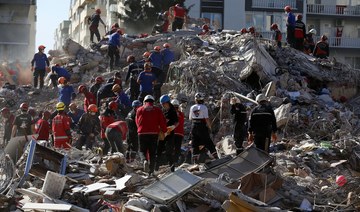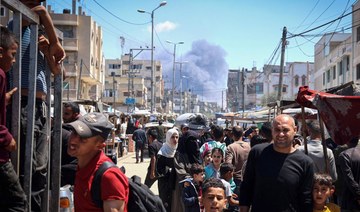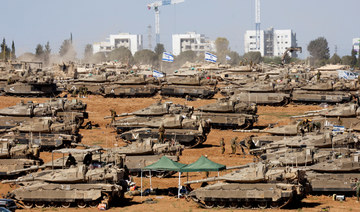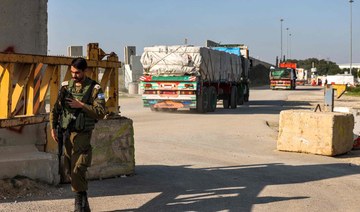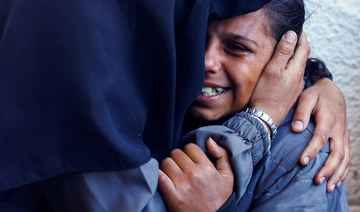JEDDAH: In the aftermath of the magnitude 7.0 earthquake in Izmir last Friday that killed at least 110 people, pressure is growing on the Turkish government to explain what happened to billions of dollars raised by a mandatory earthquake tax Turks have been paying for more than 20 years.
The tax was introduced after a magnitude 7.4 quake in the Marmara region in 1999 that killed 17,000 people. The money from it is supposed to be used to fund projects to reinforce buildings and prepare cities to better cope with earthquakes.
However, experts and opposition politicians say that much of the revenue from the tax was not spent on earthquake-protection measures, and there are growing calls for detailed information about how the money was used.
Turkish citizens have paid as much as 147.2 billion Turkish lira ($17.5 billion) in earthquake taxes since 1999. The country’s main opposition Republican People’s Party (CHP) accuses the government of misusing more than 71 billion lira that should have been used to protect cities from quakes.
On Thursday, prominent Turkish journalist Fatih Altayli said that since 2011 some of these taxes might have been spent on dealing with about 5 million Syrian refugees. Turkey has received €6 billion ($7bn) in EU aid to help the country cope with migrants and refugees.
This allegation was also raised by CHP leader Kemal Kilicdaroglu during a parliamentary speech. He asked where the earthquake taxes went and added: “But when it comes to Syrians, there is a lot of money.”
Alpay Antmen, a lawyer and CHP politician, told Arab News: “This money was meant to be used for urban transformation and for making housing areas in the earthquake zones much more resilient. However, about 70 billion lira of these taxes was spent on other purposes, and this capital was transferred to the builders close to the government.”
Last year, he said he submitted a parliamentary inquiry to Treasury and Finance Minister Berat Albayrak about the use of earthquake taxes. He was referred to the Interior Ministry, which told him it had no information.
“They are collecting these taxes from taxpayers as earthquake taxes, then they merge it into the general budget,” said Antmen. “The financial resources of the government are so depleted that it uses all available tools.”
AFAD, Turkey’s Disaster and Emergency Management Agency, which operates under the Interior Ministry, was harshly criticized for its response to the Izmir earthquake, after it asked people to send a text message if they needed blankets.
Allegations of corruption in the use of earthquake taxes are not new. In January, for example, President Recep Tayyip Erdogan responded to such claims by saying: “We spent it where it was meant to be spent … we do not have the time to provide accountability for matters like this.”
The CHP is now calling the government to account and demanding full transparency about how the taxes were used.
“When you spend the money of the citizens, you have to account for it,” said Antmen. “Otherwise it is unacceptable. Tens of billions of dollars have, however, been squandered for the relief of pro-government contractors’ debt burdens.”
CHP said that had revenue from the earthquake tax been used properly, millions of buildings around the country could have been strengthened to help them survive powerful earthquakes that are expected to hit Turkey, which lies on several active fault lines, in the coming decades.
Pressure grows on Turkish government over use of earthquake taxes
https://arab.news/w7qnr
Pressure grows on Turkish government over use of earthquake taxes
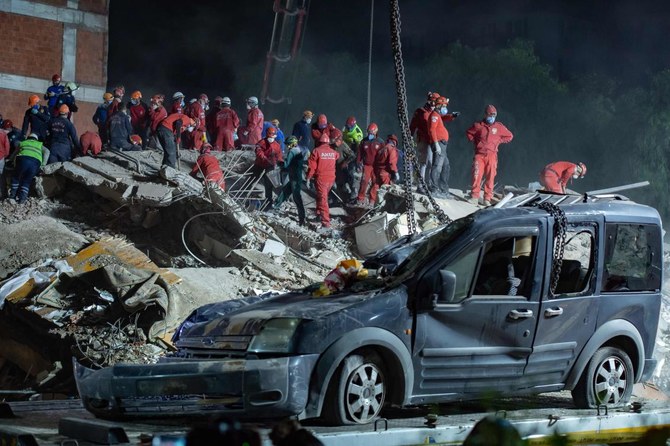
- The tax was introduced after a magnitude 7.4 quake in the Marmara region in 1999 that killed 17,000 people
- However, experts say that much of the revenue from the tax was not spent on earthquake-protection measures
Egypt police probe murder of Israeli-Canadian businessman
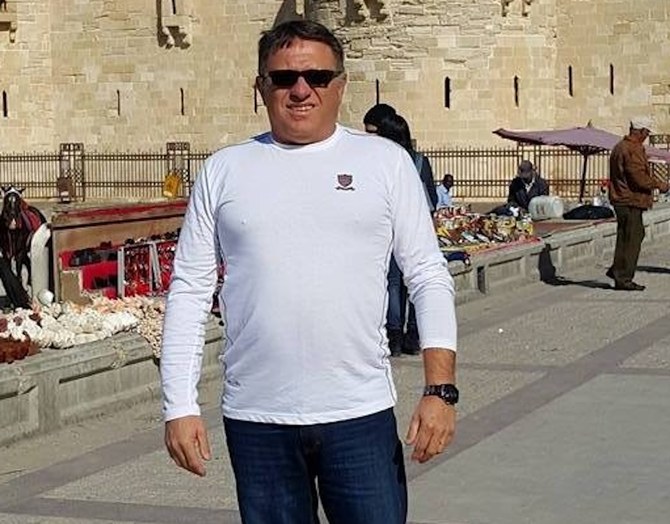
- Security sources made no link between the shooting and the dead man’s ethnic background
CAIRO: Egypt’s interior ministry said it had launched an investigation Wednesday after an Israeli-Canadian businessman was shot dead in the coastal city of Alexandria.
A police statement said the man, “a permanent resident of the country” was shot dead on Tuesday.
The Israeli foreign ministry said the murdered man was a businessman with dual Canadian-Israeli citizenship.
“He had a business in Egypt. The Israeli embassy in Cairo is in contact with the Egyptian authorities, who are investigating the circumstances of the case,” the ministry said.
Attacks on Israelis in Egypt are rare but not unprecedented.
On October 8, the day after Hamas attacked Israel triggering war in Gaza, an Egyptian policeman shot dead two Israeli tourists and their Egyptian guide.
Following their deaths, Israeli authorities advised its nationals in Egypt to leave “as soon as possible.”
Egypt was the first Arab country to sign a peace treaty with Israel but relations between the two peoples have never been warm.
The Egyptian government has often acted as mediator in flare-ups in the Israeli-Palestinian conflict that have threatened to stir up passions on the street.
Israel pounds Gaza as truce talks resume in Cairo
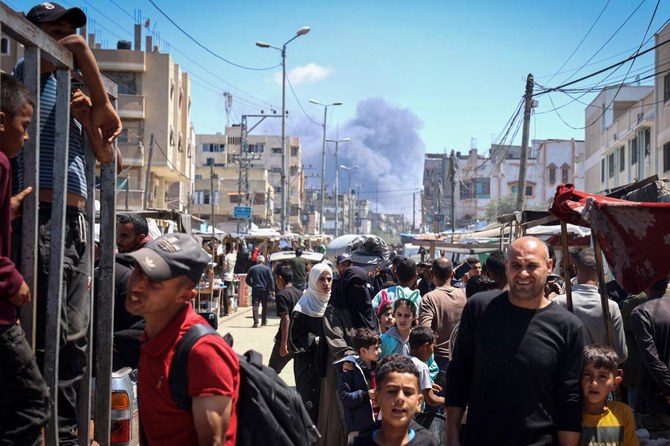
- AlQahera News: ‘Truce negotiations have resumed in Cairo today with all sides present’
- Moscow so far sees no prospect for a peace settlement in Gaza or the wider Middle East
RAFAH, Palestinian Territories: Israel bombarded the overcrowded Gaza city of Rafah, where it has launched a ground incursion, as talks resumed Wednesday in Cairo aimed at agreeing the terms of a truce in the seven-month war.
Despite international objections, Israel sent tanks into Rafah on Tuesday and seized the nearby crossing into Egypt that is the main conduit for aid into the besieged Palestinian territory.
The White House condemned the interruption to humanitarian deliveries, with a senior US official later revealing Washington had paused a shipment of bombs last week after Israel failed to address US concerns over its Rafah plans.
The Israeli military said hours later it was reopening another major aid crossing into Gaza, Kerem Shalom, as well as the Erez crossing.
But the UN agency for Palestinian refugees, UNRWA, said the Kerem Shalom crossing — which Israel shut after a rocket attack killed four soldiers on Sunday — remained closed.
It came after a night of heavy Israeli strikes and shelling across Gaza. AFPTV footage showed Palestinians scrambling in the dark to pull survivors, bloodied and caked in dust, out from under the rubble of a Rafah building.
Russia said on Wednesday that the war in Gaza was escalating due to Israel’s incursion into Rafah and that Moscow so far saw no prospect for a peace settlement in Gaza or the wider Middle East.
“An additional destabilizing factor, including for the entire region, was the launch of an Israeli military ground operation in Rafah,” Russian Foreign Ministry Spokeswoman Maria Zakharova told reporters.
“About one and a half million Palestinian civilians are concentrated there. In this regard, we demand strict compliance with the provisions of international humanitarian law.”
Speaking more broadly about efforts to find a lasting settlement in the Middle East, Zakharova said: “I would like to call it a settlement, but, alas, it is far from a settlement.”
“There are no prospects for resolving the situation in the Gaza Strip. On the contrary, the situation in the conflict zone is escalating daily.”
“We are living in Rafah in extreme fear and endless anxiety as the occupation army keeps firing artillery shells indiscriminately,” said Muhanad Ahmad Qishta, 29.
“Rafah is a witnessing a very large displacement, as places the Israeli army claims to be safe are also being bombed,” he said.
The Gaza war was sparked by Hamas’s unprecedented October 7 attack on Israel, which resulted in the deaths of more than 1,170 people, mostly civilians, according to an AFP tally of Israeli official figures.
Israel in response vowed to crush Hamas and launched a military offensive that has killed at least 34,789 people in Gaza, mostly women and children, according to the Hamas-run territory’s health ministry.
Militants also took around 250 people hostage, of whom Israel estimates 128 remain in Gaza, including 36 who are believed to be dead.
Talks aimed at agreeing a ceasefire resumed in Cairo on Wednesday “in the presence of all parties,” Egyptian media reported.
A senior Hamas official said the latest round of negotiations would be “decisive.”
“The resistance insists on the rightful demands of its people and will not give up any of our people’s rights,” he said on condition of anonymity because he was not authorized to speak publicly on the negotiations.
The official had previously warned it would be Israel’s “last chance” to free the scores of hostages still in militants’ hands.
Mediators have failed to broker a new truce since a week-long ceasefire in November saw 105 hostages freed, the Israelis among them in exchange for Palestinian prisoners held by Israel.
Mediator Qatar urges international community to prevent Rafah ‘genocide’
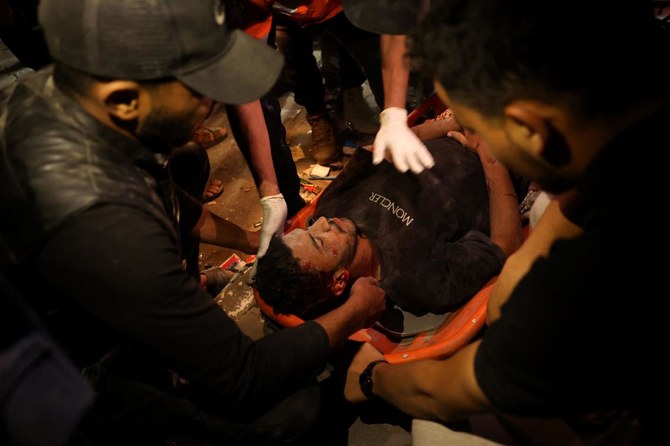
- Israel struck targets in the Gaza Strip on Wednesday after seizing the main border crossing with Egypt
- African Union condemns the Israeli military’s moves into southern Gaza’s Rafah
DOHA: Qatar called on the international community on Wednesday to prevent a “genocide” in Rafah following Israel’s seizure of the Gaza city’s crossing with Egypt and threats of a wider assault.
In a statement the Gulf state, which has been mediating between Israel and militant group Hamas, appealed “for urgent international action to prevent the city from being invaded and a crime of genocide being committed.”
Israel struck targets in the Gaza Strip on Wednesday after seizing the main border crossing with Egypt. Israel has vowed for weeks to launch a ground incursion into Rafah, despite a clamour of international objection.
The attacks on the southern city, which is packed with displaced civilians, came as negotiators and mediators met in Cairo to try to hammer out a hostage-release and truce deal in the seven-month war.
Qatar, which has hosted Hamas’s political office in Doha since 2012, has been engaged — along with Egypt and the United States — in months of behind-the-scenes mediation between Israel and the Palestinian group.
The African Union condemned Wednesday the Israeli military’s moves into southern Gaza’s Rafah, calling for the international community to stop “this deadly escalation” of the war.
AU Commission chief Moussa Faki Mahamat “firmly condemns the extension of this war to the Rafah crossing,” said a statement after Israeli tanks captured the key corridor for humanitarian aid into the besieged Palestinian territory.
Faki “expresses his extreme concern at the war undertaken by Israel in Gaza which results, at every moment, in massive deaths and systematic destruction of the conditions of human life,” the statement said.
“He calls on the entire international community to effectively coordinate collective action to stop this deadly escalation.”
Israel says it has reopened Kerem Shalom border crossing for Gaza aid
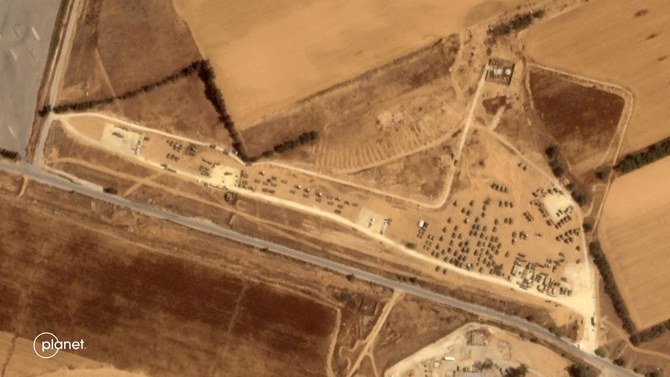
- Erez border crossing between Israel and northern Gaza is also open for aid deliveries into the Palestinian territory
JERUSALEM: Israel said it reopened the Kerem Shalom border crossing to humanitarian aid for Gaza Wednesday, four days after closing it in response to a rocket attack that killed four soldiers.
“Trucks from Egypt carrying humanitarian aid, including food, water, shelter equipment, medicine and medical equipment donated by the international community are already arriving at the crossing,” the army said in a joint statement with COGAT, the defense ministry body that oversees Palestinian civil affairs.
The supplies will be transferred to the Gaza side of the crossing after undergoing inspection, it added.
The statement said the Erez border crossing between Israel and northern Gaza is also open for aid deliveries into the Palestinian territory.
The Kerem Shalom crossing was closed after a Hamas rocket attack killed four soldiers and wounded more than a dozen on Sunday.
On Tuesday, Israeli troops seized control of the Palestinian side of the Rafah crossing between Gaza and Egypt after launching an incursion into the eastern sector of the city.
The United Nations and Israel’s staunchest ally the United States both condemned the closure of the two crossings which are a lifeline for civilians facing looming famine.
‘A blessing’: Rains refill Iraq’s drought-hit reservoirs
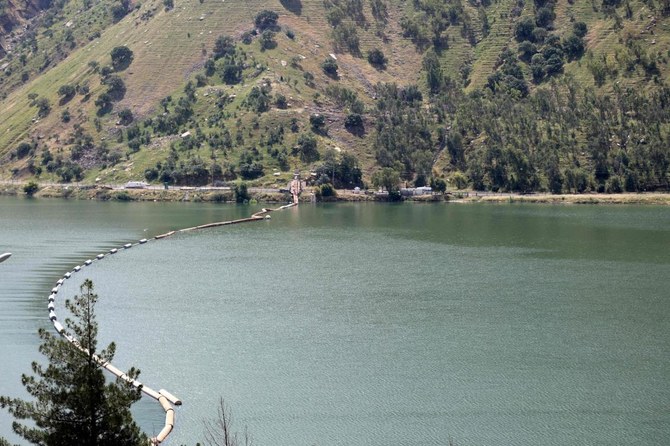
- The last time Darbandikhan was full was in 2019
- Iraq is considered by the United Nations to be one of the five countries most vulnerable to some impacts of climate change
Darbandikhan: The reservoir behind the massive Darbandikhan dam, tucked between the rolling mountains of northeastern Iraq, is almost full again after four successive years of drought and severe water shortages.
Iraqi officials say recent rainfall has refilled some of the water-scarce country’s main reservoirs, taking levels to a record since 2019.
“The dam’s storage capacity is three million cubic meters (106 million cubic feet). Today, with the available reserves, the dam is only missing 25 centimeters (10 inches) of water to be considered full,” Saman Ismail, director of the Darbandikhan facility, told AFP on Sunday.
Built on the River Sirwan, the dam is located south of the city of Sulaimaniyah in Iraq’s autonomous Kurdistan region.
“In the coming days, we will be able to say that it’s full,” said Ismail, with the water just a few meters below the road running along the edge of the basin.
The last time Darbandikhan was full was in 2019, and since then “we’ve only had years of drought and shortages,” said Ismail.
He cited “climate change in the region” as a reason, “but also dam construction beyond Kurdistan’s borders.”
The central government in Baghdad says upstream dams built in neighboring Iran and Turkiye have heavily reduced water flow in Iraq’s rivers, on top of rising temperatures and irregular rainfall.
This winter, however, bountiful rains have helped to ease shortages in Iraq, considered by the United Nations to be one of the five countries most vulnerable to some impacts of climate change.
In Iraq, rich in oil but where infrastructure is often run-down, torrential rains have also flooded the streets of Kurdistan’s regional capital Irbil.
Four hikers died last week in floods in Kurdistan, and in Diyala, a rural province in central Iraq, houses were destroyed.
Ali Radi Thamer, director of the dam authority at Iraq’s water resources ministry, said that most of the country’s six biggest dams have experienced a rise in water levels.
At the Mosul dam, the largest reservoir with a capacity of about 11 billion cubic meters, “the storage level is very good, we have benefitted from the rains and the floods,” said Thamer.
Last summer, he added, Iraq’s “water reserves... reached a historic low.”
“The reserves available today will have positive effects for all sectors,” Thamer said, including agriculture and treatment plants that produce potable water, as well as watering southern Iraq’s fabled marshes that have dried up in recent years.
He cautioned that while 2019 saw “a sharp increase in water reserves,” it was followed by “four successive dry seasons.”
Water has been a major issue in Iraq, a country of 43 million people that faces a serious environmental crisis from worsening climate change, with temperatures frequently hitting 50 degrees Celsius in summer.
“Sure, today we have rain and floods, water reserves that have relatively improved, but this does not mean the end of drought,” Thamer said.
About five kilometers (three miles) south of Darbandikhan, terraces near a small riverside tourist establishment are submerged in water.
But owner Aland Salah prefers to see the glass half full.
“The water of the Sirwan river is a blessing,” he told AFP.
“When the flow increases, the area grows in beauty.
“We have some damage, but we will keep working.”



